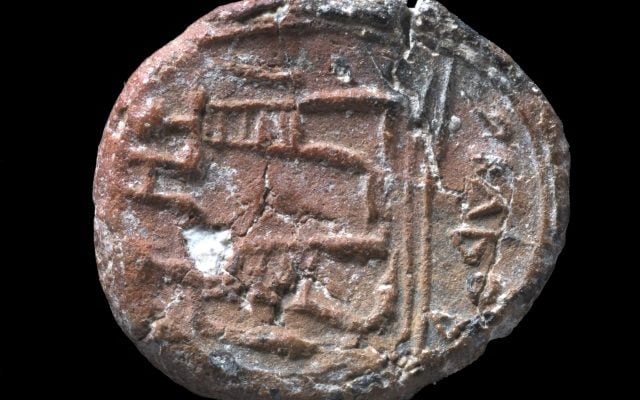With the rare discovery near the Western Wall of a seal owned by Jerusalem’s governor some 2,700 years ago, the Biblical narrative comes alive.
By: World Israel News Staff
Israeli archaeologists excavating the Western Wall Plaza recently made a unique and significant discovery when they unearthed a stamped piece of clay from the First Temple period which belonged to the “governor of the city” of Jerusalem, the most prominent local position to be held in Jerusalem 2,700 years ago.
The extraordinary find is a small lump of clay, stamped and pre-fired. It measures 13 by 15 mm and is 2 to 3 mm thick. The upper part of the seal depicts two men facing each other in a mirror-like manner, and the lower part holds an inscription in ancient Hebrew script. Its exact use is yet unknown.
Dr. Shlomit Weksler-Bdolah, excavator of the site on behalf of the Israel Antiques Authority (IAA), believes that the seal “had been attached to an important transport and served as some sort of logo, or as a tiny souvenir, which was sent on behalf of the governor of the city.”
She further suggested that “it is likely that one of the buildings in our excavation was the destination of this transport sent by the city governor.”
Finding a seal with this high-ranking title, in addition to the large assemblage of other seals found in the building in the past, supports the assumption that the excavated area, located on the western slopes of the western hill of ancient Jerusalem, was inhabited by high ranking officials during the First Temple period.
Support for the Biblical narrative
“This is the first time that such a seal is found in an authorized excavation. It supports the biblical rendering of the existence of a governor of the city in Jerusalem 2,700 years ago,” Weksler-Bdolah pointed out.
The two standing men facing each other on the seal have their heads depicted as large dots, lacking any details. The hands facing outward are dropped down, and the hands facing inward are raised. The figures are wearing a striped, knee-length garment.
In the register beneath the double line is an inscription in ancient Hebrew: לשרער, with no spacing between the words and no definite article. It denotes לשר העיר, i.e., “belonging to the governor of the city.”
Prof. Tallay Ornan of the Hebrew University and Prof. Benjamin Sass of Tel Aviv University who studied the seal explained that “the title ‘governor of the city’ is known from the Bible and from extra-biblical documents, referring to an official appointed by the king.”
Governors of Jerusalem are mentioned twice in the Bible: in Kings II, Joshua is the governor of the city in the days of King Hezekiah, and in Chronicles II, Maaseiah is the governor of the city in the days of King Josiah.
A city with a magnificent past
The seal was presented to Jerusalem’s mayor, Nir Barkat, during his visit to the Davidson Center, near the Western Wall, last week.
Barkat stated that “it is very overwhelming to receive greetings from First Temple-period Jerusalem. This shows that already 2,700 years ago, Jerusalem, the capital of Israel, was a strong and central city.”
“Jerusalem is one of the most ancient capitals of the world, continually populated by the Jewish people for more than 3,000 years. Today we have the privilege to encounter another one of the long chain of persons and leaders that built and developed the city. We are grateful to be living in a city with such a magnificent past, and are obligated to ensure its strength for generations to come, as we daily do,” he added.
After the completion of the scientific research, the seal will be on temporary exhibit in the mayor’s office.





